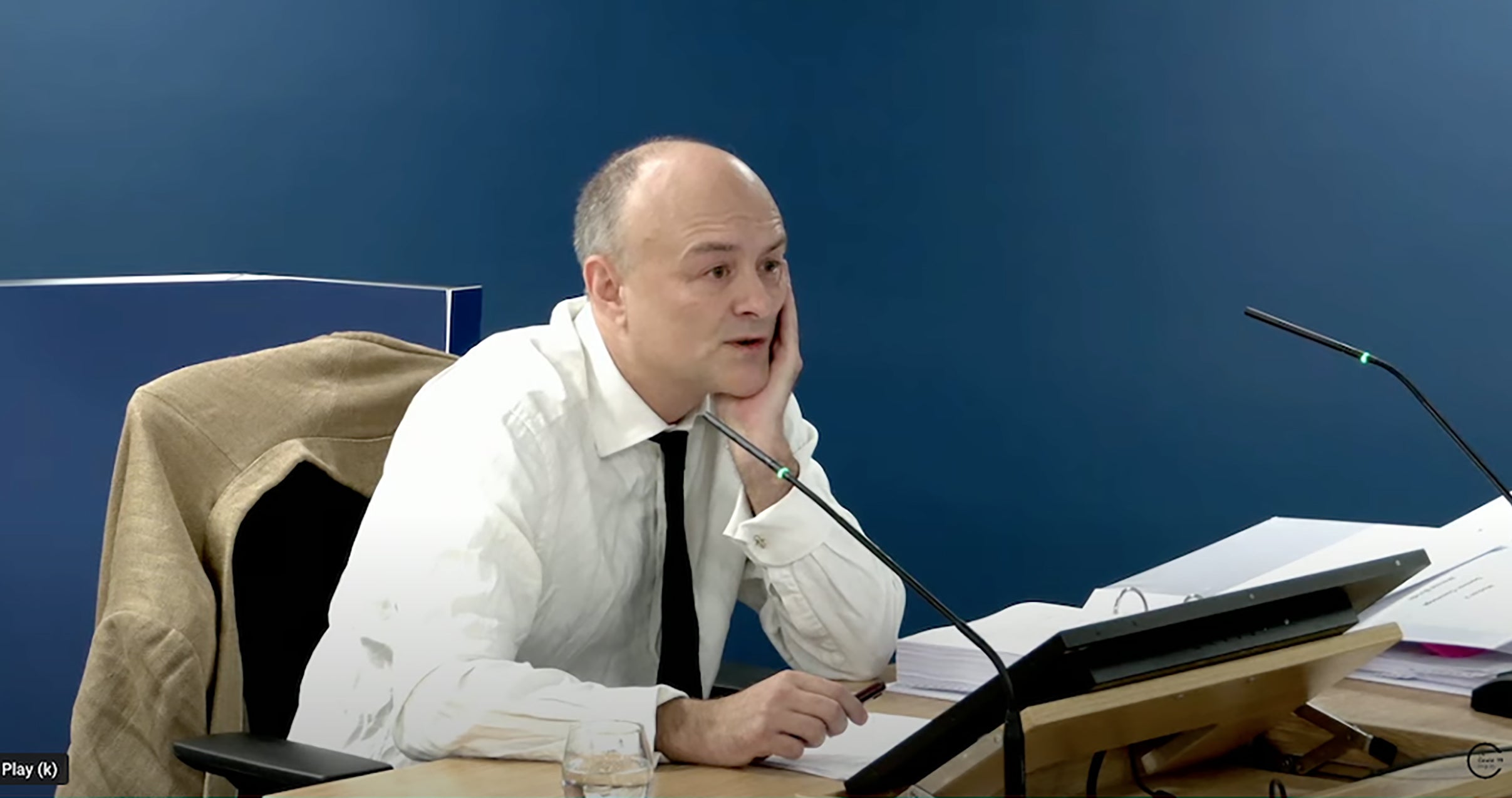It was the most shocking evidence ever heard at a public inquiry
The language was obscene, the disregard for the lives of the elderly callous, and the incompetence monumental… Dominic Cummings’s first day of evidence at the Covid Inquiry damned a chaotic, dysfunctional government – but did it provide lessons for the next public health crisis? John Rentoul sifts the evidence


Everything that happens in the Covid Inquiry room happens three minutes earlier than the outside world knows, because there is a delay on the video feed. So I got to hear some of the most shocking evidence of monumental incompetence and offensive language at the heart of government three minutes before people watching on the internet.
I was among the first to hear Lee Cain utter his immortal words. “It was the wrong crisis for the prime minister’s skill set,” said Boris Johnson’s former director of communications.
Cain – or “Caino” as he was known in the No 10 WhatsApp groups – was the warm-up act for his former boss, Dominic Cummings. Cummings arrived in the room shortly before the lunch break dressed like an academic, in a light brown jacket, and began his evidence as if it were a seminar on the British constitution.
Hugo Keith, the counsel for the inquiry, started by accusing him of “sidelining cabinet government”. Cummings replied that what “you call the sidelining of cabinet government” is something that has been a feature of the constitution for many decades.
He is quite right that the cabinet has never really made most decisions. He had many criticisms of the way government worked, which he tried to change, but he regarded cabinet as something to be managed – “a fact of life like the weather”.
Cummings said he proposed a reshuffle to “shrink the size of the cabinet back to where it was 100 years ago” – that is, about 16 people, rather than the current 23. But that Boris Johnson was not interested.
Keith then suggested that Cummings’s language “contributed to the lack of effectiveness” in government. This was the point at which Cummings apologised for the “appalling language” in his WhatsApps and emails, although I can imagine that the stenographers who were typing a simultaneous transcript of the inquiry proceedings found it a bit more interesting than their usual work.
Keith read out the f-word, the c-word, the insults lavished by Cummings on ministers and civil servants alike. But the idea that what Keith called “revolting” language itself undermined good government seems implausible.
Cain had already identified the central problem that made good government difficult, and Cummings tore into Boris Johnson’s flaws with relish. Keith asked another of his constitutionally innocent questions. Why didn’t Cummings try to get the prime minister back from his holiday during the February 2020 half-term so that he could get a grip on what Cummings was increasingly realising was a serious crisis?
Cummings’s reply was that it would have been “highly counterproductive” to try to persuade Johnson to return to No 10, because the prime minister thought concern about the virus was “another rubbish media hoax”.
Thus the inquiry continues to spend time and money telling us one thing we already know, which is that Johnson was totally unsuited to dealing with a public health crisis; and one thing that a lot of people think they know, which is that the government locked down too late.
This second is a more complicated question, but the inquiry seems to have made up its mind on this already.
Lady Hallett, the inquiry chair, interrupted Cain to ask why there was a nine-day delay between the decision to lock down and the announcement in March 2020. But Cain had already made it clear that the meeting on 14 March had not made a definite decision. Or, as Cummings put it: “This was all complete chaos.”
And the awkward fact remains that Johnson always followed the advice of the government’s scientific advisers, Chris Whitty and Patrick Vallance. However inconsistent Johnson was, his erratic leadership did not make much difference to the decisions. Johnson’s colourful messages, which veered from “it’s all rubbish” to “we must act immediately”, were hardly a careful weighing-up of the evidence. But if Whitty and Vallance were in effect determining policy, we will have to wait for their evidence to the inquiry if we really want to learn any lessons for how to deal with new diseases in future.
What we heard today at the Covid inquiry was damning – with a lot of salacious detail. Cummings and Johnson both expressed themselves in dramatic language, almost as if they were competing with each other to shock each other and the inner No 10 team.
There was an intake of breath at the inquiry, for example, when an entry from Patrick Vallance’s diary was flashed up on the big screen suspended from the ceiling, and on the tablet screens on the desks in the room. Vallance reported that Johnson told him that his party “thinks […] Covid is just Nature’s way of dealing with old people – and I am not entirely sure I disagree with them”. (That was tasteless enough, although it was in December 2020, by which time the vaccines were about to be deployed.)
But how does that help a future government prepare for another public health emergency? People in a high-pressure office said unwise things to each other in messages and emails. The only lesson politicians, advisers and civil servants are likely to learn from that is to turn on the “disappearing messages feature” in WhatsApp, and never to put anything in emails that they don’t want to see in the newspapers.
If we want to know how to handle a new infectious disease, we should look elsewhere.





Join our commenting forum
Join thought-provoking conversations, follow other Independent readers and see their replies
Comments